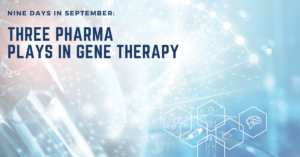Nine Days in September: Three Pharma Plays in Gene Therapy

All eyes turned to gene therapy for nine days in September, as three large pharmaceutical companies—AbbVie, Théa, and Novartis—initiated moves to foster the development of gene therapies for age-related macular degeneration (AMD), retinitis pigmentosa, and other retinal conditions. Here, we take a look at the three transactions.
AbbVie-REGENXBIO
It started on September 13, when AbbVie and REGENXBIO announced a partnership to develop RGX-314, the latter’s potential one-time gene therapy for the treatment of wet AMD, diabetic retinopathy (DR), and other retinal diseases.
RGX-314 is being evaluated in patients with wet AMD in a pivotal trial using subretinal delivery, and in patients with wet AMD and with DR in two Phase II clinical trials using the in-office suprachoroidal delivery system Clearside Biomedical is developing. RGX-314 includes a vector containing a gene encoding for a monoclonal antibody fragment. The expressed protein is designed to neutralize vascular endothelial growth factor (VEGF) activity, thereby modifying the pathway leading to formation of new leaky blood vessels and retinal fluid accumulation.
Through the agreement, REGENXBIO will assume responsibility for completing ongoing trials of RGX-314, while the two companies will share costs on future trials. AbbVie will lead clinical development of RGX-314 globally.
AbbVie agreed to pay REGENXBIO $370 million upfront, while both companies will share in profits from net sales of the product in the United States, and AbbVie will pay REGENXBIO tiered royalties on ex-US net sales. REGENXBIO will lead manufacturing for the United States, and AbbVie will do so outside. The transaction is expected to close by the end of the year.
Following the announcement, REGENXBIO’s shares jumped 31.2% to close at $43.40 on September 13, but the price has since dropped to around $35 by the beginning of the week.
AbbVie “really needs near-term growth,” said The Motley Fool contributor Brian Orelli, PhD, in a video interview. The existing pivotal trial of RGX-314 plus another planned to start in the fourth quarter could help AbbVie increase its revenue if the drug is approved by the end of 2022—which is key since AbbVie is losing market share for its blockbuster Humira (adalimumab) to biosimilar competition.
The agreement also seems to be a good deal for REGENXBIO, Dr. Orelli said, receiving capital upfront to pay for clinical trials, with the potential for additional revenue in future development, regulatory and commercial milestones.
Théa-Coave Therapeutics
Following suit, on September 16, Paris-based Coave Therapeutics, a biotech company focused on developing gene therapies in rare ocular and central nervous system diseases, announced it had entered into an exclusive licensing, codevelopment and commercialization agreement with Théa, based in central France. Théa is a European specialty pharmaceutical company focused on ophthalmology, and this move would enable Théa’s entry into retina. The agreement covers Coave’s gene therapy candidate CTx-PDE6b for patients with PDE6b-associated retinitis pigmentosa.
The agent, under evaluation in a Phase I/II clinical trial to determine its safety and efficacy, is a first-in-class, adeno-associated virus-based gene therapy designed to deliver a copy of the functional human PDE6b gene into the subretinal space. CTx-PDE6b aims to delay or halt retinal degeneration in affected patients and delay or prevent the onset of blindness.
Through the agreement, Théa will provide Coave an upfront payment and equity investment of $11.65 million (€10 million). Coave retains the rights to commercialize the agent in the United States, while Théa will receive an exclusive license to commercialize CTx-PDE6b in Europe, Ukraine, Turkey, Russia, and North Africa.
Novartis-Arctos Medical
And, on September 21, Novartis announced it had acquired the Swiss start-up Arctos Medical, adding a preclinical optogenetics-based gene therapy program to its ophthalmology portfolio.
Arctos developed its technology as a potential method to treat inherited retinal dystrophies and other diseases involving photoreceptor loss, such as AMD. Arctos’ proprietary, light-sensitive optogene is delivered to specific retinal cells using gene therapy, turning the targeted cells into replacement photoreceptor-like cells. If successful, therapeutics based on this technology could be used to treat other diseases that cause blindness because of photoreceptor death, Arctos has said.
“As a global ophthalmology leader, Novartis is ideally positioned to rapidly advance our program into the clinic,” said Kostas Kaloulis, CEO of Arctos and venture partner at +ND Capital, which incubated Arctos and led its Series A round of financing (in which Novartis Venture Fund participated). “We look forward to progressing the technology to deliver transformative therapies for underserved patients.”
